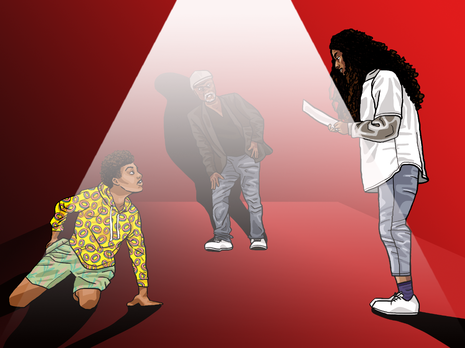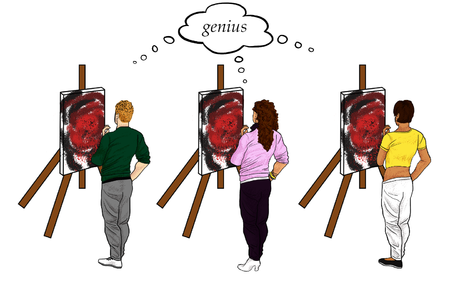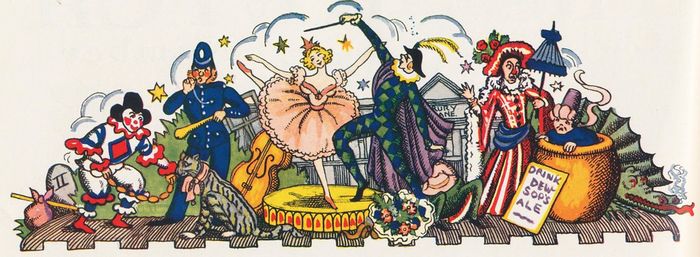In defence of GCSE Drama
Theatre Editor Bethan Holloway-Strong considers what we can learn from our Year 11 selves
CW: brief mentions of kidnapping, abuse, and addiction in theatrical productions
The words ‘GCSE drama’ can evoke a visceral response. Memories of half-baked devised pieces linger in the recesses of the brain, causing a wave of grimaces every time the drama classrooms of Year 11 are brought to mind. ‘Devising drama’ makes up 40% of the AQA Drama GCSE, and generating a full theatrical performance can seem a mammoth task. For many students, GCSE Drama is their first introduction to theatre engaging with ‘real world’ concepts: often, this is their theatrical debut. So why are there so many seemingly universal similarities across students’ devised pieces? And why, too, is there often such deep embarrassment associated with these first forays into performance?

Firstly, a confession: I didn’t actually complete any GCSEs. My dramatic education came in the form of Australian Speech and Drama exams and the dreaded American middle school drama programme (think prepubescent Glee, but somehow with more singing). My first encounter with the GCSE drama stereotype was through Lewis Brown’s TikTok videos early last year. The trappings of adolescent devised theatre were immediately familiar to me: the disjointed snatches of dialogue desperate to be ‘meaningful’ and ‘deep’, the repetitive, symbolic movements, the often disturbing subject matter. It seemed that teenage me was doing a similar thing in Australia and America as students were doing in the UK.
I remember how, in assigned groups of three, we devised pieces about truly dark topics, most of which we had never experienced ourselves. We played students on a year abroad who were kidnapped and unable to return home, a woman abused by her husband, and a mother struggling with addiction. Across the world, it seems like students are all drawing from a common, troublingly dark well. But why?
“Students seemed fixated on portraying the ‘dark realities’ of life”
The similarities between these pieces could be explained by teachers coaching their students to perform well in their exams, but such dark topics seem unlikely to be encouraged by teachers. Brown’s TikTok comments are filled with ex-GCSE Drama students comparing their experiences, puzzling over why they all chose such similar, disturbing topics.

Students seemed fixated on portraying the ‘dark realities’ of life: from teenagers facing bullying and body image issues to larger, more violent obstacles in adulthood. This isn’t a new phenomenon. Teenagers are undeniably excited by the prospect of engaging with more ‘grown-up’ issues as they mature, and facing dark topics in art gives them a vehicle for navigating the treacherous waters of adolescence. According to the Mental Health Foundation, 20% of adolescents may experience mental health issues, and 70% of these adolescents have not had appropriate interventions at a sufficiently early age. Students may be aiming for the ‘shock factor’ of disturbing topics to achieve an A*, but they are actually going a long way towards learning about emotional responses to trauma and artistic outlets for their emotions.
In Year 11, we perhaps did not realise the gravity of what we were exploring. We were still coming to terms with the sometimes troubling reality of the adult world, and the dark topics we explored were not necessarily the healthiest route for our development. Now that I’ve grown up, I would be much more mindful of how I represent traumatic experiences on stage, both for the sake of the audience and for my own mental health.
But theatre’s natural role as a medium for expression cannot be denied. It makes sense that children are utilising it to process new, intimidating experiences. The physicality of performance and the self-motivational devising process lend themselves perfectly to the new independence of adolescence. So even as they appear to produce similar scenes, GCSE students are actually going a long way to exploring their individual place in an unfamiliar world.
But looking back on dramatic pursuits in Year 11 is painfully “cringey”, according to TikTok commenters, who question why their performances were “so dramatic”. It’s natural to be embarrassed at one’s first steps into a new skill, but this degradation seems to overlook the importance of these explorations to adolescent development. Cringing at your GCSE Drama piece is no different than cringing at a baby babbling as it learns to speak.
“It’s easy to lose sight of the enormity of the creative process.”
I think we all need to cut ourselves more slack as creatives. In my time reviewing theatre in Cambridge, I’ve heard unyielding perfectionism from casts and production teams alike. Actors berate themselves over stumbled words unnoticeable to the audience, and a lighting malfunction can send a stage manager into hysterics. It’s easy to lose sight of the enormity of the creative process. Producing student theatre is a massive achievement in itself, especially alongside the demands of a degree. One role of art is, after all, to understand ourselves and make meaningful connections with others. So instead of berating your first steps into the spotlight, perhaps it’s time to give your teenage self a hug and thank them. You wouldn’t be where you are now without their help.
 News / Cambridge academics sign open letter criticising research funding changes22 February 2026
News / Cambridge academics sign open letter criticising research funding changes22 February 2026 News / Supporters protest potential vet school closure22 February 2026
News / Supporters protest potential vet school closure22 February 2026 News / Student and union protesters hold ‘Trans Liberation Solidarity Rally’ 24 February 2026
News / Student and union protesters hold ‘Trans Liberation Solidarity Rally’ 24 February 2026 News / Union speakers condemn ‘hateful’ Katie Hopkins speech14 February 2026
News / Union speakers condemn ‘hateful’ Katie Hopkins speech14 February 2026 News / Hundreds of Cambridge academics demand vote on fate of vet course20 February 2026
News / Hundreds of Cambridge academics demand vote on fate of vet course20 February 2026










